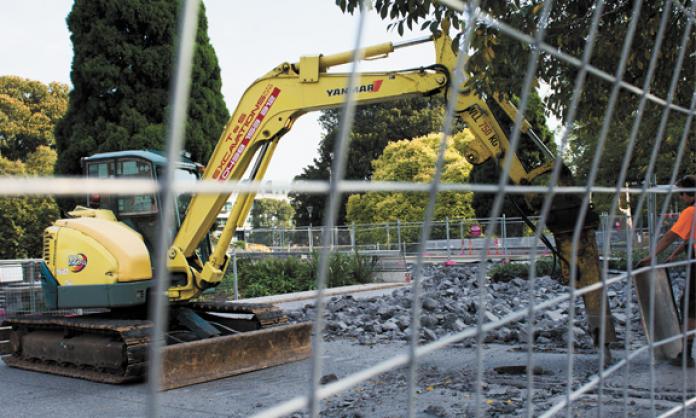If I wasn’t in my 70s and blind, I’d have taken a skateboard to Lincoln Square in Carlton every day in recent weeks to take lessons from the young people skating there. Anything to spite the la-di-da Melbourne lord mayor Robert Doyle and the snobbish professor at Melbourne University, who have been conducting a campaign against skateboarders.
They have turned one of the best parks for skating in the country into rubble. Young people there when the jack hammerers turned up were threatened and had their boards ripped from them and thrown away.
They ask me why. Why indeed? Why would a council spend $450,000 destroying such a popular space – full of life, friendship and what would be called “community spirit”?
The answer is that the “community minded” mayor – infamous for sending in cops to brutally drive out protesters occupying City Square in 2012 – and others such as professor Roz Hansen of Melbourne University are determined that only those acceptable to their narrow-minded view should be visible in public spaces.
In 2005, a beautiful park was destroyed and turned into a mausoleum as a memorial to the victims of a terrorist bomb in Bali. It was unbearably hot in summer and cold and bleak in the winter. But then skateboarders discovered that it was an ideal space: on the tram line, mostly deserted and good for many levels of skill.
They have been coming from far and wide. Mostly unemployed youths and students, but champion skaters with their kids and backpackers also come. I met a young woman up from the Latrobe Valley for a medical appointment carrying her skateboard to visit the famous square.
The park’s destruction is a disgrace, a monumental waste of money that could have been used to renovate the severely degraded children’s play area or for any number of badly needed services.
In the name of balance and fairness, I’ll list the arguments of the middle class trash. A council spokeswoman expressed outrage to the Age that up to 50 people sometimes congregate there. We can’t have people in parks – unless of course they’re the kind the middle classes approve of. There’s no campaign against the 50-plus who gather for salsa dancing in the Piazza a block away.
Our illustrious professor – a city resident for 16 years, the Age obligingly informs us, as if this gives her special rights – said: “This is my local park but I can’t go and sit in it because of the overwhelming noise”. Apart from the assumption that it’s her park, who does she think she’s kidding? Go sit in it or on an apartment balcony over the road. It’s Swanston Street, full of cars and rattling trams!
Apparently “skaters used screwdrivers to remove ‘no skating signs’ and metal brackets meant to stop them skating on retaining walls”. The professor calls this vandalism. I call it initiative. As I said in a letter that the skaters told me was read out, to their delight, at a council meeting in 2014, “All hail the disobedience of the youths who defy the signs”.
Residents of Melbourne receive a glossy magazine boasting about the “culture” and “inclusiveness” of the city. What it doesn’t tell you is if you’re not middle class with lots of money involved in what respectable people approve of, or if you want to make your voice heard about inequality and injustice, then you’re excluded.
Our professor finds the skaters “intimidating”. Not believable. I used to take my young grandsons toddling around, playing in the fountains, and we were never intimidated.
I feel massively more unsafe in Lygon Street navigating restaurant tables and chairs, touters trying to get you to sample their overpriced grub, dodging harried staff carrying scalding food and drinks, than I ever have in Lincoln Square. But then that’s profit-generating and respectable. And as for attending a protest these days, you never know when you’ll be pepper sprayed or walked on by a police horse. But then that’s keeping order.
Skating rights might seem a trivial issue when refugees are being tortured in hellish camps, fascists are feeding off Islamophobia, workers’ rights and living standards are under attack. But the right to use public spaces as we see fit, every issue of the rights of those with fewer resources who disrupt middle class respectability, matters.
Because the respectable, the politicians, those who want a “cultured” “community” want it on their terms, their order, riff-raff are marginalised and invisible. That way their sense of entitlement and their status as born to rule are safe; their confidence to squash protests and to enforce draconian laws remains intact.









